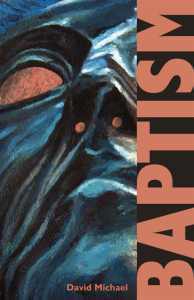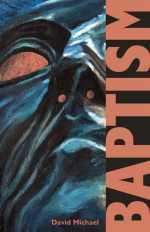Baptism (Part 2 of 3)
by David Michael
Read Part 1 of "Baptism" here.
 Spring Solstice (continued)
Spring Solstice (continued)Myra screamed– No, she wanted to scream, but nothing came out. She didn't–couldn't–open her mouth as she felt Antonio's life pulled into her. She couldn't even whimper as her lovely, young husband mummified in front her eyes. The desiccation started in the fingers of his left hand and his toes and moved toward his heart and head. She saw his sculpted limbs deflate, his washboard abs and square-cut pecs shrivel and finally his lips pull away from his teeth and his eyes dry into wrinkled prunes. She heard his last breath come out as a wheeze, felt it touch her face. It smelled of damp dust.
When she released his right hand, it didn't fall. What had once been Antonio was now a kneeling sculpture of ripped leather stretched over bones.
What was left of her managed to scream. But she couldn't stop herself from reaching to touch–to grab–the next kneeling person, an elderly Latina dressed in the blue-gray uniform of a resort maid. Or the pudgy white man in the too-small Speedo trunks behind the woman. Or the little Asian girl.
She couldn't stop herself. When the people–finally–began to pull away from her, to run for their lives, she had no choice but to follow them.
The people were still saying her name, but now it was a scream. "Myra! Myra!"
She would reach, grab, and–she didn't know what she did then. She felt as if she inhaled their lives. She felt the water coming out of them, flowing into herself. Her body didn't change. She remained the shape of Myra Acevedo. With each person she–absorbed–drank–killed–though, she became less and less Myra Acevedo.
Myra Acevedo drowned for the second time in one day. After a while, she didn't even scream. It was too late. Even for screaming.
Winter Solstice
Myra spread her hands in front of her. They were still the hands of a beautiful trophy wife who had never had to work a real job once she blossomed in college. Long, slender fingers with a spa-perfect manicure. The only thing that had changed since she died was that the nail polish–aqua, to match her new suit–had been etched away by the hot, dry winds.
She didn't know how long ago she had died. It could have been years. It could have been yesterday. It might have been last week.
How long did it take to destroy the world? How long did it take one young woman to drain the oceans?
Not long enough for her still naked breasts to sag, it seemed, but long enough for the last remnant of her bikini to be gone.
"Holy Mother," said the voice of a girl behind her.
Only the girls would speak to her, or the youngest of the boys. Perhaps it was her nakedness.
A part of Myra still objected to the children calling her Holy Mother. It was blasphemy. Or heresy. Or worse. She had become a demon. A monster. She had done monstrous things. But another part of her accepted the appellation. Myra Acevedo had never been a mother, not really, but some part of her had.
"Holy Mother," the girl, Sumalee, said again. "Why have you brought us here?"
Sumalee didn't speak English or Spanish, but Myra understood her. She understood all the children, and as long as she was nearby, they understood one another.
Myra didn't turn around. She didn't open her mouth to speak. She didn't know what she would say. She spread her arms, palms backward toward the children, indicating that they should stay back.
"There is no food here, Holy Mother."
Myra didn't respond. She stood there, on the broken edge of what had once been the Golden Gate Bridge, arms spread, palms down now, face forward and up, eyes closed against the brightness of the sun.
She didn't say anything. There was nothing for her to say. There was no food anywhere. She had been very thorough.
Summer Solstice
She didn't kill everyone. She didn't need to.
Where she walked, dry death followed. Where she stepped, plants died. Where she breathed, people and animals choked on dust and killed one another fighting over scraps of food and drops of water that evaporated before touching their tongues.
Some people tried to run away from her. She didn't give chase. She merely walked, one foot after the other. Where people waited for her, usually on their knees, hands clasped in front of them, praying their ignored prayers, she touched them and took them and left their husks disintegrating in her wake.
She walked with her arms spread, palms forward, as if she expected someone to hug her. As if she were looking to embrace everyone and everything. Some men and women accepted her embrace, throwing themselves at her, weeping or crying for mercy for themselves or their families. Always she put her arms around them and held them to her as they fell apart and fell away. Orphaned children–children she had orphaned–cried and held out their little arms to her to hold them, and she did. At first.
After that first day at the resort, the day she died, Myra never again walked along the sea coast or the bank of a river or the shore of a lake or pond. The waters of the world, including the man-made resevoirs, were picked up by the hot, hungry winds and brought to her. She took the waters in and they were lost in the depths of her. The oceans of Earth disappeared into the beautiful, walking corpse of Myra Acevedo.
A swirling vortex formed around her. The winds of the earth pushed against her, tried to take back the moisture she stole from them. The winds failed to budge her even as they tore apart the forests and jungles of Central and South America and ravaged the flesh of the living and scoured the bones of the dead.
The points of knifes and swords, the bullets of Glocks and Brownings and AK's and AR's, all of them tried to stop her. Tank shells and LAW rockets and artillery bursts and bunkerbusters rained on her in their attempts to free the rains locked within her. Like the winds, the weapons failed. The greatest, deadliest weapons ever built didn't even slow her. She walked among the corpses the weapons left behind and burned and blackened flesh crumbled and was picked up by the winds.
To her, she only walked. She put one foot ahead of the other. But where each foot would set down she had no idea. At the beginning of her odyssey she had walked through Central and South America, and then North Ameria. She had walked in Brazil and Argentina and Mexico and Canada and the United States of America. Then, for no reason that she knew, she shifted, from one step to the next, thousands of miles. She had walked in China and Thailand and India and Australia and Indonesia and Saudi Arabia and Myanmar and the Congo and Italy and more. She might take a step in Chicago, and her next step would be in Rome, and then in Chihuahua followed by Buenos Aires and Shanghai. She could be in a field of withering soybeans, then step into a rice paddy that dried and cracked even before her foot pressed against the rich soil.
Myra had no names for all the lands she walked, all the cities she saw surrounded by rings of shiny, abandoned cars clogging highways, all the villages and towns that burned and left nothing behind. The part of her that was not Myra, though, had no use for the names of the places. None at all. She just walked, always walking.
Her next step brought her to the peak of a dune. She let her arms drop to her side and her shadow slid under her feet to hide from the sun directly over her head. She faced east and looked across the rounded dunes. The dunes ended less than a mile from where she stood, sloping into dark canyons.
The dunes, which had once been a beach, gleamed with bits of seashells and the dried skeletons of fish and was littered with broken metal and glass and plastic. In the canyons beyond the dunes, which had once been the Atlantic Ocean, she saw boats lying on their sides. As she watched, she saw a man step from one of the boats. He had a bright white hat on his head and carried a bundle bound in tarpaulin.
She took a step, and she was behind the man, close enough to touch. He spun as she put a hand on his shoulder, but she didn't let go. His suddenly weak arms dropped his bundle and it burst, spilling canned goods and bottles of water across the naked rocks.
The cans and bottles around their feet collapsed in on themselves with loud pops and protests, some of them flopping about like the fish that had died weeks–months?–years?–before. The thin, stiff corpse of the man broke along his waistline and fell away from her as she let go.
"Daddy!" The voice of a little boy, coming from inside the boat.
Myra turned to look at the boat. A little boy looked out of a dusty window. The boy saw her see him, and disappeared into the darkness of the boat. She found him in the bow locker.
The little boy cowered and squeezed his eyes shut so he couldn't see her.
She wanted to tell him that she didn't hate him. That she didn't know why she had to do this, this thing she had to do. But when she opened her mouth, all she could say was, "It is too late." Then she put her hand on his head, as if to comfort him.
Winter Solstice
The winds swirled around Myra on the bridge, but they had lost their fury, their passion. The winds had been reduced to rejected suitors who could not bear to be near her and yet always sought her out. Only their need remained.
It is too late.
Those were the only words she had been able to speak for as long as she could remember. So she had stopped saying anything.
If this was the end, she had no one left to talk to.
Except the children.
Behind her she heard the children whispering. Whispering to one another, whispering about her. Whispering about their empty bellies and dry throats and chapped lips.
She had never said a word to the children. They had talked to her.
TO BE CONTINUED
Part 3 of "Baptism" will be Posted on
Monday, 22 November 2010.

Read the rest of the story on your ereader right now!
"Baptism" Edition
Price
Kindle edition (Amazon)
$0.99
Ebook (Smashwords)
$0.99
Published on November 15, 2010 11:36
No comments have been added yet.



